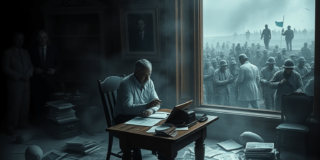Eliza Hamilton Dunlop was a European migrant of Irish extraction who tried to give Indigenous Australians a ‘voice’ during a time when we were all but silenced. ‘The Aboriginal Mother’ was written in response to the Myall Creek massacre, in which some thirty unarmed Indigenous men, women and children were shot and slashed to death by stockmen on a remote property in northern New South Wales in June 1838. The poem takes the form of an anguished address by the mother, supposedly the sole adult survivor of the killing, to her now fatherless child.
The Aboriginal Mother
By Eliza Hamilton Dunlop
First published in The Australian 13 December 1838
Oh! Hush thee – hush my baby,
I may not tend thee yet,
Our forest-home is distant far,
And midnight’s star is set.
Now, hush thee – or the pale faced men
Will hear thy piercing wail,
And what would then thy mother’s tears
Or feeble strength avail!
Oh, could’st thy little bosom,
That mother’s torture feel,
Or could’st thou know thy fathers lies
Struck down by English steel;
Thy tender form would wither,
Like the kniven in the sand,
And the spirit of my perished tribe
Would vanish from our land.
For thy young life, my precious,
I fly the field of blood,
Else had I, for my chieftan’s sake,
Defied them where they stood;
But basely bound my woman’s arm,
No weapon might it wield:
I could but cling round him I loved,
To make my heart a shield.
I saw my firstborn treasure
Lie headless at my feet,
The goro on his hapless breast,
In his life-stream is wet!
And thou! I snatched thee from their sword,
It harmless pass’d by thee!
But clave the binding cords – and gave,
Haply, the power to flee.
To flee! My babe – but wither!
Without my friend – my guide!
The blood that was our strength is shed!
He is not by my side!
Thy sire! Oh! Never, never
Shall Toon Bakra hear our cry:
My bold and stately mountain-bird!
I thought not he could die.
Now who will teach thee, dearest,
To poise the shield, and spear,
To wield the koopin, or to throw
The boommerring, void of fear;
To breast the river in its might;
The mountain tracks to tread?
The echoes of my homeless heart
Reply – the dead, the dead!
And ever must the murmur
Like an ocean torrent flow:
The parted voice comes never back,
To cheer our lonely woe:
Even in the region of our tribe,
Beside our summer streams,
‘Tis but a hollow symphony –
In the shadow-land of dreams.
Oh hush thee, dear – for weary
And faint I bear thee on –
His name is on thy gentle lips,
My child, my child, he’s gone!
Gone o’er the golden fields that lie
Beyond the rolling clouds,
To bring thy people’s, murder cry
Before the Christian’s God.
Yes! O’er the stars that guide us,
He brings my slaughter’d boy:
To shew their God how treacherously
The stranger men destroy;
To tell how hands in friendship pledged
Piled high the fatal pire;
To tell, to tell of the gloomy ridge!
And the stockmen’s human fire.


Great poem thanks for sharing it with us.
its my pleasure 🙂
Pingback: Early Colonialism in Australia | Literature & Life Spring 2015
I want the poem that starts like this:
Thy sire! Oh! Never, never shall toon.
I had the great pleasure to work alongside some aboriginal Ringers on Newcastle Waters many years ago and am proud to call them my friends
That is great to hear Patrick. I have sadly never had any Indigenous friends, and I wish I did.
Have just read in paper that Aus is to get a Poet Laureate next year. Saw reference to above poem and read it – absolutely wonderful poem. I do hope that the new PL does write real Poems! Can’t stand those that are just words strung together with no actual Poetry.
Read this and weep. Many Australians (not enough) know the words and facts of the massacres of our indigenous sisters and brothers, but only the poetry can fully evoke the feelings of horror, shame and loss. So sorry. All Australians need your voice, your wisdom and connection to the land.